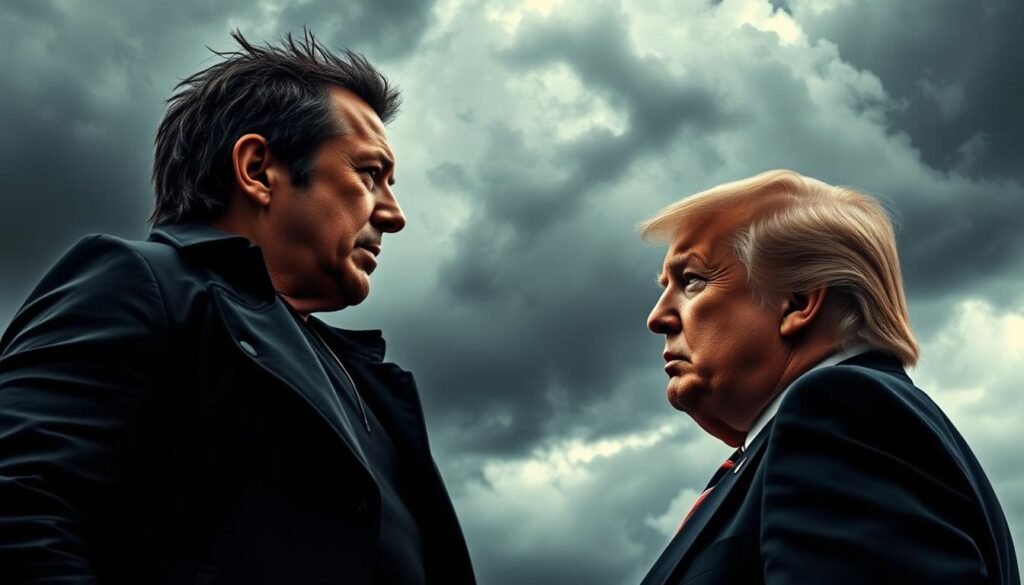Physical Address
304 North Cardinal St.
Dorchester Center, MA 02124
The ongoing clash between political figures and cultural icons often sparks heated debates. One such controversy involves the stark contrast between Donald Trump’s political stance and the values represented by Bruce Springsteen, a revered figure in American music.
Despite their differences, Springsteen’s fans have shown unwavering support for the Boss, highlighting the deep connection between the artist and his audience.

This dynamic reflects not just a musical preference but a broader cultural allegiance, as fans rally around the values and messages Springsteen embodies through his work.
The contrasting images of Bruce Springsteen, the working-class hero, and Donald Trump, the billionaire businessman, highlight the deep-seated divisions within American society. While Springsteen is revered for his authentic connection to the common man, Trump’s persona is marked by his luxury brand and business dealings.
Bruce Springsteen’s enduring appeal lies in his down-to-earth persona and his ability to craft music that resonates with the working class. His image is built on authenticity, with a career spanning decades and a fanbase that appreciates his commitment to social causes.
In contrast, Donald Trump’s public image is deeply intertwined with his status as a billionaire businessman. Trump’s persona is characterized by his luxury brand and business ventures, which have been a hallmark of his public identity, both before and during his presidency.
The juxtaposition of Springsteen and Trump’s personas represents a broader cultural clash in America. This contrast is not just about individual personalities but reflects deeper societal divisions, including attitudes towards wealth, identity, and the role of celebrity in politics.
| Aspect | Bruce Springsteen | Donald Trump |
| Public Image | Working-class hero | Billionaire businessman |
| Core Values | Authenticity, social justice | Luxury, business acumen |
| Public Perception | Relatable, down-to-earth | Polarizing, controversial |
As a renowned American musician, Bruce Springsteen has a long history of engaging in political activism through his work. His commitment to social justice and political causes has been evident throughout his career, influencing fans and fellow artists alike.
Springsteen’s early work, such as “The River”, touched on themes of economic hardship and the struggles of the working class. These themes were not only reflective of his own experiences but also resonated with a broader audience affected by economic downturns.
Over the years, Springsteen’s political voice has evolved, becoming more pronounced and direct. Albums like “The Ghost of Tom Joad” and “Magic” showcased his ability to address complex political issues through his music, from immigration to the Iraq War.
Springsteen has supported various causes, including voter registration drives and benefits for social justice organizations. His involvement in the Vote for Change tour in 2004 is a notable example, demonstrating his commitment to using his platform for political engagement.
| Year | Album/Performance | Political Theme |
| 1980 | “The River” | Economic hardship, working-class struggles |
| 1995 | “The Ghost of Tom Joad” | Immigration, social justice |
| 2007 | “Magic” | Anti-war, critique of the Iraq War |
Donald Trump’s interactions with celebrity culture, particularly in the music industry, have been a subject of controversy and public debate. His presidency was marked by a complex interplay between politics and celebrity, with music being a significant aspect of this dynamic.
Before entering politics, Trump had established himself as a celebrity figure through his business ventures and media appearances. His presence in the tabloids and reality TV shows like “The Apprentice” contributed to his celebrity status, making him a household name.
This pre-existing celebrity status played a role in his political career, as it provided him with a level of recognition and media attention that many politicians can only aspire to.
During his presidential campaign, Trump’s rallies featured a curated selection of music, which became a point of contention. Artists like Tom Petty and Pantera objected to the use of their songs, leading to public disputes.
The choice of music at these rallies often reflected Trump’s appeal to his base, but it also highlighted the tension between political campaigns and artistic expression.
Trump received endorsements from some celebrities, which he often highlighted during his campaign. However, many more celebrities publicly distanced themselves from Trump, criticizing his policies and persona.
| Celebrity | Endorsement/Rejection | Notable Action |
| Steven Tyler | Rejection | Publicly objected to the use of his music |
| Meat Loaf | Rejection | Legally challenged Trump’s use of his song |
| Tom Petty | Rejection | Objected to the use of “American Girl” |
The dynamic between Trump’s political identity and the celebrity world was complex, with music being a significant battleground. This comparison between Trump’s interactions with celebrity culture and the reactions it provoked provides insight into the broader cultural landscape during his presidency.
In the ongoing cultural clash between Springsteen and Trump, fans have decisively backed the legendary musician. This support is not merely a reflection of Springsteen’s musical prowess but also his alignment with the values and sentiments of his fanbase.
Recent surveys and social media trends indicate a strong allegiance to Springsteen among his fans. When asked about their views on Springsteen versus Trump, a significant majority expressed support for the former. This is reflected in various fan reactions across platforms, where fans have vocalized their disdain for Trump’s policies and persona, contrasting them with Springsteen’s advocacy for social justice and equality.
For instance, a survey conducted among Springsteen’s fanbase revealed that over 80% of respondents identified as liberal or progressive, aligning with Springsteen’s publicly stated values. The table below summarizes the survey findings:
| Category | Percentage |
| Liberal/Progressive | 82% |
| Conservative | 10% |
| Moderate | 8% |
Springsteen’s fanbase is diverse, spanning various age groups, geographical locations, and socio-economic backgrounds. However, a common thread among them is their appreciation for Springsteen’s music and the values he represents. The demographics reveal a predominantly white, middle-class fanbase with a strong presence of blue-collar workers, reflecting Springsteen’s “working-class hero” image.
Key demographic insights include:
The clash between Bruce Springsteen’s values and Trump’s policies has led to a series of public exchanges and criticisms.
Bruce Springsteen has been vocal about his disapproval of several Trump-era policies. He has used his platform to raise awareness and rally opposition against these policies, often through his music and public appearances. For instance, Springsteen has criticized Trump’s stance on immigration and healthcare, viewing them as contrary to American values.
Springsteen’s criticisms are not limited to policy; he has also spoken out against the divisive rhetoric used during Trump’s campaign and presidency. By doing so, Springsteen has become a symbol of resistance for many who feel disenfranchised by Trump’s policies.
Trump has responded to celebrity critics, including Springsteen, by questioning their relevance and patriotism. Trump has often taken to social media to counter criticisms, labeling celebrities as “elites” out of touch with ordinary Americans.
The back-and-forth between Trump and celebrity critics like Springsteen highlights the broader cultural divide in America. Trump’s responses are part of a larger strategy to mobilize his base by portraying himself as a champion of the common man against out-of-touch elites.
| Issue | Springsteen’s View | Trump’s View |
| Immigration | Criticized Trump’s hardline stance, advocating for more humane policies. | Supported stricter immigration controls and border security. |
| Healthcare | Opposed efforts to repeal the Affordable Care Act, supporting expanded healthcare access. | Advocated for repealing and replacing the Affordable Care Act. |
| Divisive Rhetoric | Condemned Trump’s divisive language, promoting unity and inclusivity. | Used controversial language to mobilize his base, often targeting minority groups. |
The misinterpretation of “Born in the USA” as a patriotic anthem, rather than an anti-war statement, highlights the tension between artistic expression and political appropriation. Bruce Springsteen’s song, released in 1984, was intended as a critique of the treatment of Vietnam War veterans upon their return to the United States. However, its message was often lost, and it was misinterpreted as a jingoistic anthem.
Springsteen’s “Born in the USA” is a powerful song that tells the story of a Vietnam veteran’s struggles upon returning home. The lyrics convey a sense of disillusionment and frustration with the government’s handling of the war and its aftermath. Despite its clear anti-war and pro-veteran message, the song was adopted by some as a patriotic anthem, symbolizing a misinterpretation that underscores the complexities of cultural reception.
The song’s title and chorus were often stripped of their context, leading to a misunderstanding of Springsteen’s intended message. This misinterpretation reflects a broader issue of how music can be co-opted for various agendas, sometimes contrary to the artist’s original intent.
The use of “Born in the USA” as a patriotic anthem, particularly during Donald Trump’s presidential campaign, exemplifies the political appropriation of music. Trump’s use of the song at rallies without Springsteen’s endorsement highlighted the tension between the artist’s political views and the political use of his music. This incident underscores the challenges artists face in controlling the interpretation and use of their work in political contexts.
The controversy surrounding “Born in the USA” serves as a case study for the complex relationship between music, politics, and cultural identity. It illustrates how songs can be imbued with meanings that diverge from their original intent, reflecting broader societal debates and political divisions.
In the digital age, social media has become a crucial platform for Bruce Springsteen fans to express their unwavering support. As the cultural and political divide widens, fans are leveraging these platforms to showcase their loyalty to the Boss.
On Twitter and Facebook, Springsteen fans are actively engaging in discussions about the artist’s political stances and music interpretations. They share quotes from Springsteen’s songs, highlighting lyrics that resonate with their own views on social justice and American identity.
A closer look at the data reveals a significant trend: fans are not just passively consuming Springsteen’s music; they’re using it as a catalyst for online discussions.
| Platform | Primary Use | Engagement Level |
| Real-time discussions | High | |
| Community building | High |
During Springsteen’s concerts, fans express their loyalty through fervent reactions, often turning the events into political rallies. The energy is palpable, with fans singing along to anthems like “Born in the U.S.A.” and “The Rising.”
Fan communities, both online and offline, play a crucial role in mobilizing support for Springsteen’s causes, further solidifying the bond between the artist and his fanbase.
The role of celebrities in politics is a multifaceted issue, sparking both support and controversy. As influential figures, celebrities like Bruce Springsteen have the power to shape political views and sway public opinion on various issues.
Celebrities can bring significant attention to social and political causes, leveraging their massive followings to mobilize support and raise awareness. This can be particularly impactful during election cycles, where endorsements can potentially influence voter decisions.
The impact of celebrity endorsements on voter opinions is a subject of considerable debate. Some argue that celebrity influence can be a powerful tool, especially among younger voters who may be more impressionable. For instance, when a well-known celebrity like Springsteen speaks out against a particular policy or politician, it can generate significant media coverage and public discussion.
However, not everyone is convinced of the value of celebrity involvement in politics. Critics argue that celebrities often lack the expertise to make informed political judgments, potentially leading to misguided or oversimplified solutions to complex issues. This controversy surrounding celebrity political activism highlights the need for a nuanced understanding of their role in shaping public discourse.
In comparing the influence of different celebrities, it becomes clear that their comparison to political figures like Trump can be particularly revealing. While some celebrities are praised for their political engagement, others face backlash for their perceived lack of understanding or for being out of touch with the general public.
As the cultural divide in America continues to grow, the contrast between Springsteen’s values and Trump’s policies has put fans in a tough spot. The Boss’s progressive ideals and commitment to social justice have been a hallmark of his career, attracting a devoted fanbase that shares these values.
Despite Springsteen’s outspoken criticism of Trump, there are fans who support both the Boss and the former President. This seeming paradox highlights the complexity of fan identity and the diverse political beliefs within Springsteen’s fanbase. Some fans may appreciate Springsteen’s music while disagreeing with his political views, illustrating the multifaceted nature of fandom.
Navigating the intersection of fandom and political identity can be challenging. Fans must reconcile their admiration for Springsteen’s music with their own political beliefs, which may not always align with the artist’s views. This internal conflict can lead to a deeper understanding of both the music and the fan’s own political identity, fostering a more nuanced appreciation of the complexities involved.
The ongoing clash between Bruce Springsteen and Donald Trump has sparked a range of economic responses from fans and the music industry alike. As a result, the divide has led to both boycotts and support campaigns that impact various aspects of Springsteen’s career and the broader music industry.
The controversy surrounding Springsteen and Trump has influenced album sales and concert attendance. Fans showing their support for Springsteen have driven sales of his albums, with many turning to his music as a form of political expression. Concert attendance has also seen a boost, as fans rally around the artist and his values.
This surge in album sales and concert attendance demonstrates the power of music as a unifying force among fans who share similar political beliefs. It also highlights the economic loyalty of Springsteen’s fanbase, who are willing to show their support through their purchasing decisions.
Beyond album sales and concert attendance, the economic impact is also evident in merchandise sales. Springsteen’s brand has seen a resurgence, with fans purchasing merchandise as a way to show their allegiance and support for the artist. This not only boosts revenue but also serves as a form of grassroots marketing, as fans wear and display Springsteen’s branding.
The loyalty of Springsteen’s fanbase is a key factor in the economic dynamics at play. Fans are not just consumers; they are active participants in the cultural and economic narrative surrounding the artist and his music.
The cultural divide highlighted by the contrast between Bruce Springsteen and Donald Trump is a reflection of deeper societal issues in America. This comparison is not just about two individuals; it’s about the political views and values they represent.
At its core, the divide between Springsteen and Trump speaks to fundamental aspects of American identity. As Springsteen’s music often highlights the struggles of the working class, it resonates with a particular segment of the population that feels overlooked.
The contrast between Springsteen and Trump also underscores the role of class and geography in shaping political alignment. Springsteen’s heartland rock anthems often evoke a sense of regional pride and solidarity among working-class Americans. In contrast, Trump’s appeal has been characterized by a different demographic: often, those who feel disenfranchised by coastal elites and globalization.
“You can’t start a fire without a spark, this gun’s for hire, but it’s something that this man can do.”
The Springsteen-Trump controversy also reveals a generational divide. Younger generations, who have grown up with Springsteen’s music as a soundtrack for social change, are more likely to be critical of Trump’s policies. This generational perspective highlights how cultural icons and political figures are viewed through different lenses across age groups.
The clash between Bruce Springsteen and Donald Trump represents more than a celebrity disagreement; it symbolizes a deeper cultural divide. Springsteen’s music has long been a voice for the working class, echoing sentiments that resonate with fans who feel disenfranchised by policies they see as favoring the elite.
Music plays a significant role in shaping political views and fostering a sense of community among those who share similar beliefs. Springsteen’s Born in the USA tour, for instance, became a rallying point for fans who saw the song as an anthem of patriotism and protest. The loyalty of Springsteen’s fanbase demonstrates the power of artists to inspire and mobilize.
In times of political polarization, music remains a potent force. It not only reflects the mood of the nation but also influences it. As seen in the reactions to Trump’s presidency, music can become a battleground, with artists and their work being co-opted or contested by different political camps.
Ultimately, the enduring power of music lies in its ability to capture the spirit of an era and to inspire action. As the cultural landscape continues to evolve, artists like Springsteen will remain crucial in shaping the narrative and influencing political views.




